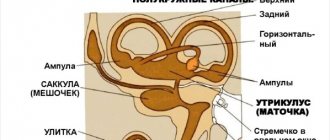How the human vestibular system works and why the feeling of dizziness occurs
Dizziness is a subjective sensation. The patient perceives it as a change in body position in space. There is a feeling of swaying, spinning of the body or surrounding objects.
The vestibular apparatus is of great importance in maintaining balance. It is located in the inner ear and is part of a complex mechanism that ensures coordination of movements and the ability to navigate in space. To perform these functions, the device must interact with other organs (eyes, brain, skin). If this interaction is disrupted, the person loses balance, which is accompanied by dizziness and impaired coordination of movement.
Emotions that make you feel dizzy
Often, dizziness and subsequent fainting are caused by severe emotional stress. It leads to activation of the sympathetic nervous system, due to which the lumen of blood vessels narrows and blood flow to the brain decreases. These can be negative emotions (severe fear, anxiety, excitement) and positive ones (joy, delight).
Why do you feel dizzy when bending down?
Dizziness when tilting your head down (the causes of the condition may be different) is most often physiological in nature. But sometimes a symptom indicates the occurrence of a disease in the body that requires a visit to the doctor.
During pregnancy
The feeling of dizziness often occurs in women in the first trimester of pregnancy. This rare symptom does not require treatment.
In some cases, dizziness occurs frequently, which may be a sign of:
- low hemoglobin. To correct the condition, iron supplements are prescribed and consumption of iron-rich foods is recommended;
- unbalanced nutrition, strict diets. The cause of dizziness attacks in this case is a lack of glucose, which provides the body with energy.
Physiological reasons
Dizziness can also occur in a completely healthy person. It can be provoked by severe excitement, an emotional outburst, provoking the active production of adrenaline. This leads to spasm of cerebral vessels, slowing blood flow and dizziness.
Also, discomfort can be caused by:
- sudden movements;
- unbalanced diet, skipping meals;
- taking certain medications (sedatives, antihistamines);
- lack of sleep;
- excessive physical activity;
- food poisoning;
- staying in a stuffy room.
Causes associated with diseases
In some cases, the cause of dizziness is certain diseases or their consequences.
The problem may be caused by:
- osteochondrosis. When bending downward, the vertebral artery can be pinched, causing a disruption in blood flow;
- microstroke. Dizziness may be the first symptom of a vascular accident;
- otitis media The patient suffers from pain in the ears; when bending sharply, he may feel dizzy;
- rupture of the membrane that separates the middle and inner ear. The pathology is accompanied by additional symptoms: ear pain, hearing impairment, cough;
- low blood pressure. Most often, hypotension is a symptom of another disease, so it is necessary to accurately determine the cause of the disorder;
- low hemoglobin, which requires menu adjustments or medications;
- Meniere's disease (pathology of the inner ear). In addition to dizziness, it is accompanied by attacks of nausea, deafness, and ear pain.
- transient attack. The condition may be caused by high blood pressure or high glucose levels in diabetes. Pain in the eye area occurs, coordination is impaired;
- neoplasms. Unpleasant symptoms develop due to compression of certain areas of the brain by the tumor.
Discomfort may also occur when:
- flu and colds;
- cervical spine injuries;
- vegetative-vascular dystonia;
- cardiac diseases.
Dizziness when tilting your head down, the causes of which are associated with any disease, requires a mandatory visit to the doctor. After a thorough examination to clarify the diagnosis, the necessary treatment will be prescribed.
Complications of dizziness
In most cases, this symptom is not dangerous. But if an attack begins suddenly, in a place that is inconvenient for a person, it can lead to unpleasant consequences.
If you suddenly feel dizzy when bending down, you may lose your balance. This is especially dangerous if he is alone and there is nowhere to expect help. The patient may faint, which will cause injuries to the limbs and soft tissues, bone fractures, and bruises of internal organs. A concussion is also possible.
The most terrible consequence of dizziness when bending down is hemorrhage under the membranes of the brain. It is dangerous because it may not manifest itself in any way in the first hours after the injury. During this time, blood accumulates under the lining of the brain. When enough of it has accumulated, the hematoma compresses the brain tissue. As a result, the patient loses consciousness and may fall into a coma.
Therefore, anyone who experiences frequent dizziness should definitely seek medical help to prescribe appropriate therapy.
Symptoms other than dizziness
Dizziness is often called manifestations that have nothing to do with this condition, for example:
- darkening of the eyes, provoked by a sudden change in body position;
- feeling of a veil before the eyes;
- fainting state;
- feeling of weakness, nausea, unsteadiness in the legs;
- imbalance, unsteadiness when walking.
Therefore, a person who has an appointment with a doctor should describe his feelings as accurately as possible. Further diagnostics and methods for correcting the condition depend on the accuracy of their description.
Diagnostics
Dizziness when tilting your head down, which occurs repeatedly, requires mandatory consultation with a doctor. After diagnosis, consultation with other specialists (for example, angiosurgeon) may be necessary. It is important to establish the cause of the disorder; only in this case will therapy be successful.
Physical examination
First of all, the specialist listens to the patient’s complaints. This allows you to determine the type of dizziness, which can be vestibular or non-vestibular.
Conducting a physical examination, the doctor examines the ears to determine whether there are pathologies in the external auditory canal or whether the eardrum is damaged. It is also necessary to evaluate the functioning of the visual organs for the presence of abnormal movements, such as nystagmus (twitching). The direction of eye movement will help determine the cause of dizziness. The specialist will also evaluate the patient’s gait, ability to maintain balance and coordinate their movements.
Instrumental examination
After the examination, you will need to take a detailed blood test.
The specialist will also recommend:
- X-ray of the cervical spine;
- Ultrasound of the heart and thyroid gland;
- vascular angiography;
- electrocardiograms;
- Brain MRI.
Depending on what pathologies are detected, the method of therapy is selected. To eliminate severe symptoms, medication and exercise are used.
Prevention of dizziness
To prevent the occurrence of this symptom, it is necessary to normalize sleep and rest patterns. It is also worth adjusting your diet. Eat more fish dishes, nuts, eggs, cheese and cottage cheese.
Special exercises have been developed to train the vestibular apparatus. They are quite simple and do not take much time. However, they are very effective in preventing dizziness:
- Sit down, straighten your back and turn your head to one side. Lie in this position. Movements should be smooth, not abrupt.
- Sit down again and turn your head in the other direction.
- Perform this exercise for 3-4 minutes.
For exercises to have an effect, they need to be done every day several times a day.
When help is needed urgently
Dizziness when tilting your head down (causes may be related to a life-threatening condition) sometimes requires immediate medical attention. You need to call an ambulance if the patient’s limbs go numb, pain in the chest appears, and speech is impaired. Such signs indicate a violation of cerebral circulation.
Severe dizziness in menopausal women requires urgent medical intervention. In women during menopause, hormone levels change, which leads to thickening and increased blood viscosity. At the same time, the likelihood of sudden strokes or heart attacks increases.
In addition to dizziness, a person may suffer from nausea and vomiting. This indicates damage to brain structures. If asymmetry appears on the face, you should urgently seek medical help.
Symptoms accompanying dizziness
Often, if a person complains of looking down and feeling dizzy, this is not the only complaint. The patient may not present other complaints at first, but the doctor should question him in detail and conduct a series of objective examinations.
Dizziness may be accompanied by the following symptoms:
- changes in blood pressure: hypertension (increase) and hypotension (decrease);
- increased heart rate (tachycardia);
- muscle weakness and body aches;
- nausea and vomiting;
- headache;
- heat;
- heavy sweating;
- pale skin;
- ear pain;
- fainting;
- convulsions;
- high blood sugar.
If you feel dizzy when bending down, this is accompanied by any of the symptoms listed above, you should definitely consult your doctor. After all, only a qualified specialist can comprehensively examine the patient and make the correct diagnosis.
What to do first if you feel dizzy when tilting your head
During an attack of dizziness, the main thing is not to get confused. Also, do not panic; you need to do everything possible to alleviate your condition.
If there is no one nearby who can help, you must:
- stop any activity;
- do not close your eyes, focus on a specific object, so as not to lose consciousness;
- open the window for fresh air;
- take a comfortable position, lying or sitting, do not make sudden movements;
- Unbutton the top buttons on your shirt, take off your shoes, and get rid of tight accessories.
When it gets a little better, you can eat something sweet. This will help you get back to normal faster. If the condition worsens despite the measures taken, it is necessary to urgently call an ambulance.
Treatment of regular dizziness when tilting the head
If the unpleasant symptom is not caused by any disease, changing your lifestyle will help normalize the condition. You need to adhere to a clear daily routine, alternating work and rest. Every day you need to walk in the fresh air and do feasible physical exercises.
The body must receive sufficient amounts of vitamins and minerals, so the menu should be supplemented with healthy foods. You should stop drinking alcohol and smoking, as this disrupts the functioning of all body systems.
Drugs
Treatment is prescribed depending on the detected disease. Pathologies of infectious origin require the use of antiviral or antibacterial drugs. For patients with osteochondrosis, the use of anti-inflammatory drugs is recommended. If the cause of dizziness is a stroke, medications that improve cerebral circulation are needed.
Symptomatic treatment is also used. It does not eliminate the cause of the disorder, but reduces the degree of discomfort. Medicines of different groups are used.
Medications for dizziness:
| Group of drugs | Name | |
| Antihistamines | Promethazine | 75-100 mg in 3-4 doses |
| Diphenhydramine | 25-50 mg every 4-6 hours. | |
| Sedatives | Seduxen | 0.5-1 tablet in 2-4 doses |
| Tranquilizers | Diazepam | 1 mg every 12 hours. |
| Antiemetics | Cerucal | 5-10 mg every 6 hours. |
| Antihypertensive | Enalapril | 2.5-5 mg 1 time per day |
| Verapamil | 40-80 mg 3 times a day | |
| Statins | Lovastatin | 10-80 mg 1-2 times a day |
| Anti-inflammatory | Meloxicam | 7.5-15 mg 1 time per day |
Exercise therapy
Dizziness when tilting the head down, the causes of which are associated with impaired blood flow and poor functioning of the vestibular apparatus, is treated with the help of gymnastic exercises.
The exercises have no contraindications and can be done daily. But it is advisable to start exercising for the first time in the presence of another person, since the patient’s body’s reaction can be unpredictable.
A set of exercises for dizziness:
- Sitting on the edge of the bed, put your feet on the floor or just hang them down. Breathing is deep and even.
- Lie on your side, carefully turn your head up to an angle of 45°.
- Remain in this position for 30 seconds.
- Return to a sitting position for 30 seconds.
- Repeat the exercise while lying on the other side.
- Do 5 repetitions for each side, stopping for 15 seconds. before each approach.
Brandt-Daroff vestibular gymnastics
If during the exercise your health does not deteriorate and there is no dizziness, then the exercises are repeated every other day. If discomfort is present, then you need to do gymnastics 2 more times (before bed and in the morning).
Gymnastics, which should be performed daily in the morning, will help prevent the appearance of dizziness after the condition has returned to normal:
- In a lying position, make horizontal movements with your eyes, then vertical ones, bringing them closer together, trying to look at the finger approaching your nose.
- Move your head, gradually accelerating. First the eyes must be open, then they must be closed.
- Take a sitting position, turn your head to the sides, bend over. The exercise is first done with open and then with closed eyes.
Once you get used to this complex, you can complicate the exercises, for example, by adding throwing a small ball from hand to hand or under the knee. Then do squats with your eyes open and closed. If the exercise is not accompanied by unpleasant symptoms, you can perform torso turns. Walking on a flat surface with your eyes closed is also useful, while you can turn your head in different directions.
This complex promotes better orientation in space and prevents the occurrence of dizziness. You need to study for about 2 months for at least 10 minutes. in a day.
For those with chronic dizziness, the following complex is recommended:
- In the 1st week of classes - circular movements of the head, turns to the sides.
- In the 2nd week of classes - body tilts to the sides, forward and backward.
- From the 20th day of classes - an exercise reminiscent of boxing with an imaginary opponent.
- From the 25th day of classes – walking backwards. At the same time, you should try not to turn your head.
You can do such gymnastics only if there are no serious health problems.
Traditional methods
Eating the following helps relieve attacks of dizziness:
- carrot-beet juice on an empty stomach;
- grenade;
- clover decoction;
- linden-mint infusion;
- black sweet tea.
Ginger is a good remedy.
You can use it in different ways:
- If you experience discomfort, chew a small piece. This eliminates nausea, restores coordination;
- cook food with added spices, which is a good prevention of dizziness;
- brew tea with ginger.
You can also improve your condition using aromatherapy. The aromas of plants such as rosemary, sage, thyme soothe and eliminate discomfort.
Patients who experience dizziness due to low blood pressure will benefit from tincture of ginseng root. If discomfort occurs, you need to take 30 drops of the product with a glass of water. You can also get rid of discomfort using warm water with honey and apple cider vinegar or oregano decoction.
To prevent dizziness it is useful to use:
- hawthorn tincture (1 tsp per 0.5 cup of water);
- garlic tincture, for the preparation of which a head of garlic is crushed and infused in alcohol. Take on an empty stomach, dissolving the product in milk;
- basil tincture (1 tbsp dry raw material per 1 tbsp boiling water, leave for 20 minutes).
Treatment
Treatment for a condition where you feel dizzy when bending down directly depends on the cause of the problem. For infectious diseases, antiviral drugs and antibiotics are used, for osteochondrosis, anti-inflammatory drugs are effective, for strokes, drugs are prescribed to improve cerebral circulation. This treatment is called etiotropic.
There is also symptomatic treatment. Its goal is not to eliminate the cause of the discomfort, but to reduce the severity of the symptom. If a patient complains that he feels dizzy when he tilts his head down, the doctor prescribes medications from the following groups:
- antihistamines: “Diphenhydramine”, “Promethazine”, “Pipolfen”;
- sedatives: “Seduxen”, “Andaksin”;
- tranquilizers: Lorazepam, Diazepam;
- multivitamin complexes;
- anti-nausea medications: Cerucal, Metoclopramide, since dizziness is often accompanied by nausea and vomiting.
Prognosis and possible complications in the absence of therapy
In most cases, dizziness does not pose a threat to human health. However, if the symptom occurs unexpectedly, there is a risk of loss of balance and falling, which may result in injury to the patient. If discomfort is caused by any disease, adequate and timely treatment will help prevent the development of complications.
A symptom left unattended can cause:
- transition of existing pathologies into a chronic form;
- traumatic brain injuries;
- bruises, fractures;
- stroke;
- apathy, depression.
Dizziness when tilting your head down has different causes. In a healthy person, the problem is solved by normalizing the daily routine, nutritious nutrition, giving up bad habits and feasible physical activity. If the symptom is caused by any disease, it is necessary to treat it.
But in order to establish the cause of the disorder, you should first visit a doctor who will conduct a thorough diagnosis and prescribe medications if necessary. It should be remembered that dizziness in some cases is a sign of a life-threatening condition, so if alarming accompanying symptoms appear, you should immediately call an ambulance.









